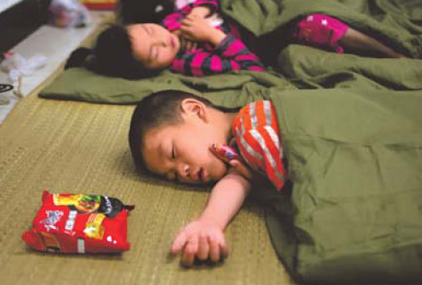Farmers choose to live or die with their homes
Flood victims who refused to quit their houses hamper relief efforts.
He Yin, 14, and her 6-year-old brother He Yu had been trapped in their flooded home in Changkai town for more than 24 hours when their uncle finally arrived to rescue them.
 |
|
A boy falls asleep in Fuzhou stadium last week. The stadium was used to house people displaced by floods in Jiangxi province. |
After driving for 400 km from the city of Ganzhou, Zhu Lianfa had guided one of the speedboats being used to evacuate residents straight to the children's doorstep - yet they were still reluctant to leave.
"I want to stay with my mother," said He Yin, her eyes welling with tears.
"We still have many items at home, like blankets, towels and other daily supplies," she protested as she boarded the boat, leaving her parents to follow on later.
"Adults can come later," said Zhu as he held He Yu in his arms. The boy was suffering a high fever and needed medical attention.
"Children are the priority. They need to be somewhere safe that has clean drinking water."
More than 100,000 people in four towns were trapped by floodwaters when Fuhe River burst its banks on June 21, puncturing a large hole in a protective dike 2 km upstream of Changkai in eastern Jiangxi province. With more torrential rain forecast within days, thousands of soldiers and rescue workers were quickly deployed to evacuate residents using 1,800 boats before the next wave of floods hit.
Such a mammoth task with limited resources would pose a headache for any authorities, yet in Changkai it was a mission further complicated by the many people who refused to leave their homes.
Although He Yin could be accused of being a naive child, thousands of townsfolk, old and young, shared her belief that they would stand a better chance of protecting homes and businesses by staying put.
"I took one person by boat to his home as he said he wanted to save his family," said 20-year-old solider Wang Ji. "When we got there, he brought out several people and then he went back in and refused to come out.
"(This) just makes our rescue efforts all the more difficult," he said, sighing in frustration.
Like many of the soldiers, Wang is not from Jiangxi, so not only is he unfamiliar with the environment (the boats regularly hit low walls or become tangled in crops or bushes), he also could not understand the local dialect. Rescuers had to rely on local volunteers and cadres to help them.
When villagers refused to leave or attempted to jump out of the boats and return home, it was up to these volunteers to persuade them otherwise.
"It's going to rain and the water level is going to rise tomorrow. I can't come back to save you again," Liu Boqing, head of a village also called Changkai, shouted at a middle-aged man standing at the second-floor window of a house. After a few minutes of unsuccessful negotiation, the official signaled the solider to move on to the next area.
"I can't force him," said Liu shrugging. "For the time being we need to focus on getting elderly people and children out. If anything happens to him, though, it will be my responsibility."
Rescuers told China Daily that the time wasted on convincing people to go with them had resulted in missions that should have lasted two hours instead lasting sometimes more than three or four hours.
"These people are worried about their livestock, their television sets, their refrigerators," said Liu. "Many villagers here also make a living in construction and they are pretty sure that the buildings are not going to collapse."
You Meiqing, 23, who chose to stay at home with her 1-year-old son, insisted they were in no danger.
"If the flood gets worse, I'll just move everything up to the next floor," said the housewife, whose husband works away from their hometown. She eventually agreed to move to an evacuation center.
 0
0 







Go to Forum >>0 Comments